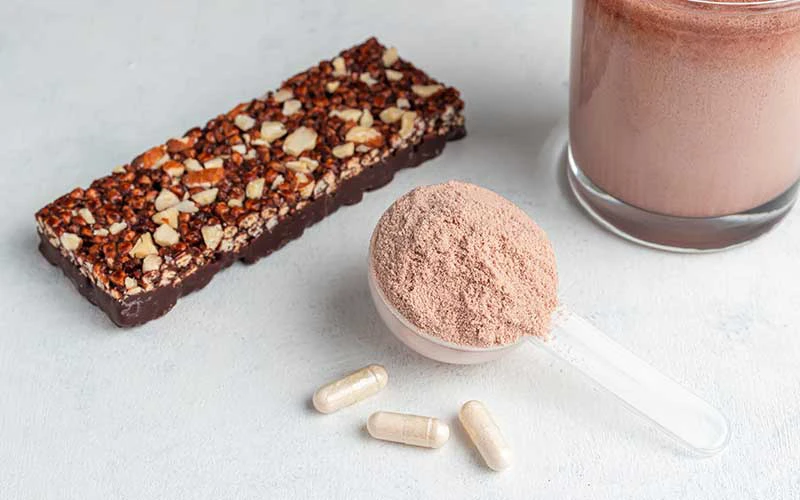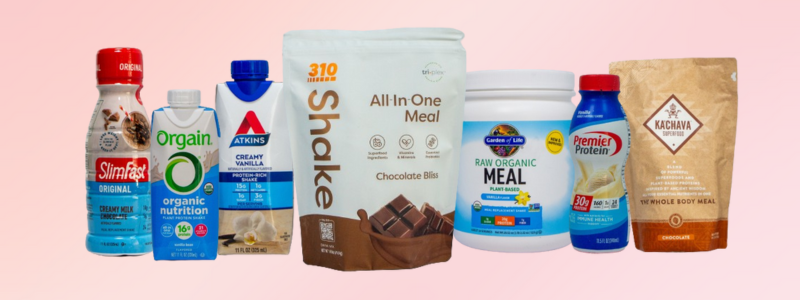We know you’ve been there (because we have to!). You’ve...
For the past several years, meal replacements have become increasingly popular for people seeking a quicker meal option for their busy lifestyles that is still healthy and nourishing. Many of these meal replacement products offer essential nutrients and additional ingredient blends that can help support overall wellness.
How can meal replacements potentially benefit your health, goals, productivity and more? Read on to become knowledgeable about these supplements that will only continue to become more popular, and can help you get the edge you need for healthier living.
What Are Meal Replacements?
Meal replacements are specially-formulated food products that can be used to replace one or more regular meals while providing essential nutrients and calories. Meal replacements are convenient, nutritionally balanced food products that can replace one or more regular meals. They provide essential nourishment and energy, making them helpful for weight management and meeting dietary needs. They offer portion management and can assist in organized dietary plans.
They’re typically available in bars, shakes, soups, or powders to be mixed with liquids. Meal replacements are convenient for individuals with busy lifestyles or specific dietary needs. They provide a balanced and nutritionally complete alternative to traditional meals. These meal replacement products are commonly used for weight management, improving overall nutrition, or as a temporary solution when preparing or consuming a regular meal is challenging.
Some meal replacement shakes have a higher protein content, which can benefit weight loss while preserving muscle mass. Nevertheless, it’s better to view them as a convenient option when you cannot prepare or have a proper meal.
Components of a Balanced Meal Replacement
A well-rounded meal replacement may include nutrients and minerals necessary for maintaining good health. The components of a balanced meal include:
Proteins: Proteins: Understanding the difference between meal replacement shakes and protein shakes is crucial, as meal replacements should contain high-quality protein sources such as whey, casein, soy, pea, or other plant-based proteins..
Carbohydrates: Complex carbohydrates from whole grains or vegetables are included in meal substitutes to provide sustained energy levels and promote digestive health.
Fats: Healthy fats like monounsaturated fats and omega-3 fatty acids may be included to support heart health and increase satiety.
Vitamins and Minerals: Meal substitutes typically contain essential vitamins and minerals to ensure nutritional adequacy and help meet daily requirements.
Fiber: Fiber is added to meal substitutes to promote healthy digestion, aid in weight management, and provide a sense of fullness.
How Do Meal Replacements Work?
One of the key advantages of meal substitutes is their ability to assist with calorie control and portion sizes. They come in controlled serving sizes, allowing individuals to monitor their calorie intake more accurately. This feature is beneficial for managing energy balance and achieving specific dietary goals, such as weight loss, maintenance, or muscle gain.
Meal replacements also eliminate the need for meal preparation, making them extremely convenient for people with busy lifestyles that are often on-the-go to get balanced nutrition in their meals. This convenience is particularly helpful for those who find it challenging to maintain a balanced diet consistently.
Health Goals and Role of Meal Replacements
Let’s dig a little deeper into some ways that meal replacements support specific health goals: some specific roles of meal substitutes concerning health goals:
Weight management: Meal replacements support weight loss by replacing one or more meals with a nutritionally-balanced option, reducing overall calorie intake while maintaining essential nutrients.
Nutritional supplementation: Meal replacements can help with nutrient deficiencies or gaps in one’s regular diet by ensuring an adequate intake of essential nutrients, especially when certain food groups are restricted, or specific dietary needs must be met.
Sports nutrition: Athletes and fitness enthusiasts use meal substitutes for convenience and to get the necessary nutrients for performance, muscle repair, and growth.
Convenience and time-saving: Meal replacements are a fast and easy way for busy people to eat healthily without having to cook or spend much time on meals.
Different Types of Meal Replacements

There are many different types of meal replacements available, and each type offers distinct compositions, uses, pros and cons. Let’s explore them in detail:
Meal Replacement Shakes
Composition and Use: Meal replacement shakes are typically powdered formulations that can be mixed with water, milk, or plant-based alternatives. These shakes are designed to provide a complete meal’s worth of nutrients in a convenient, drinkable, and often delicious form.
Pros and Cons:
| Pros | Cons |
| Convenient and quick to prepare | Some meal replacement shakes may contain added sugars or artificial ingredients |
| Portion-controlled and calorie-counted | May not provide the same satisfaction as a whole food meal |
| Customizable with additional ingredients for flavor/nutrition | Not suitable for individuals with specific dietary restrictions or allergies unless specifically formulated |
Meal Replacement Bars
Composition and Use: Meal replacement bars are compact, pre-packaged bars that provide a balanced mix of macronutrients (protein, carbohydrates and fat), and micronutrients (vitamins and minerals). These bars are designed to offer a convenient meal replacement option for those with busy lifestyles or when access to traditional meals is limited.
Pros and Cons:
| Pros | Cons |
| Portable and easy to carry | Some bars may contain high levels of added sugars or artificial ingredients |
| Long shelf life for stocking up and travel | May not offer the same level of satiety as whole food meals |
| Satisfying texture and chewiness | Texture and taste preferences can vary |
Meal Replacement Smoothies
Composition and Use: Meal replacement smoothies are blended beverages that combine various ingredients such as fruits, vegetables, proteins, healthy fats, and additional supplements. They offer a refreshing and customizable option for meal substitutes, providing a balance of nutrients in a liquid form.
Pros and Cons:
| Pros | Cons |
| Can be prepared with fresh, whole food ingredients, providing high nutritional content | Requires access to a blender or food processor for preparation |
| Offers a wide range of flavor combinations to suit personal preferences | Preparation and cleanup can be time-consuming compared to other options |
| The blended nature of smoothies can provide a feeling of fullness and satisfaction | May not be as convenient for on-the-go consumption without proper cups/bottles |
Choosing the Right Meal Replacement
When deciding on a meal replacement product, understanding your own dietary needs and health goals is crucial. It helps you find the right fit for various goals like weight loss, muscle building, maintaining a balanced diet, or managing specific health conditions. Additionally, considering factors such as taste preferences, food sensitivities, and nutritional requirements can further guide your choice. You should take suggestions from a professional healthcare provider or a registered dietitian. They can give you personalized recommendations that suit your specific situation.
Another important thing that you’ll want to do before making a decision is reviewing the nutritional information on the packaging. This information provides valuable insights into serving sizes, calorie content, and macronutrient balance. It shows you the amounts of carbohydrates, proteins, and fats that will be included in that meal. By understanding this information, you can ensure that the meal replacement aligns with your specific nutritional requirements.
Last but not least, it’s important to consider any dietary restrictions or allergies you might have. By carefully reviewing the ingredients and labels, you can ensure the meal replacement is safe to consume without any adverse effects.
Effective Utilization of Meal Replacements
Next, let’s take a look at how to use meal replacements, once you pick a product and determine your goals.
Developing a Meal Replacement Plan: When creating a meal replacement plan, it’s a good idea to consult a professional to determine your nutritional needs and goals. Consider calorie intake, macronutrients, and dietary restrictions to personalize the plan.
Scheduling Meal Replacements for Optimal Results: Replace one or two meals daily with meal substitutes while enjoying whole food meals for balance. Find a schedule that fits your lifestyle and supports your goals, such as replacing breakfast or post-workout meals.
Balancing Meal Replacements and Whole Foods: While meal substitutes are convenient, they should be balanced with whole foods. Whole foods provide diverse nutrients and should be incorporated to ensure a comprehensive nutrient profile. Aim for variety and include fruits, vegetables, proteins, grains, and healthy fats in your whole food meals.
Benefits of Meal Replacement

When you’re in a hurry and really hungry, making a nutritious meal from scratch is only sometimes feasible. That’s why many people are drawn to the simplicity and convenience of meal replacements. Let’s explore the advantages of replacing your regular meals and highlight some of our favorite options. Here are the top 5 benefits of meal replacements:
Convenience: One of the notable benefits of meal replacements is their convenience. After a stressful day, instead of staring into your fridge and opting for takeout, a meal replacement shake offers a quick and nutritionally complete alternative. Meal replacements provide a solution to these common diet pitfalls. They are ready-to-consume meals packed with essential nutrients that can be prepared in seconds.
Calorie control: Many individuals struggle with calorie counting when cooking at home. A drizzle of olive oil here, a sprinkle of cheese there, and your meal becomes highly calorific before you know it. However, unlike popular belief, liquid meal replacements can be surprisingly filling.
Real results: Numerous studies on meal replacements have demonstrated impressive weight loss outcomes. You might assume that any weight loss would quickly return to the notorious “diet” effect.
Time-saving: By freeing up some of your mealtimes and having a nutritious meal ready instantly, you gain more time to focus on other aspects of your life.
Cost-saving: Eating organic vegetables, free-range eggs, and wild-caught fish can sometimes be expensive. While we believe that health and wellness should be accessible on any budget, meal substitute diets can offer a more budget friendly choice for one or two daily meals. This helps reduce your grocery bill while still supporting a healthy lifestyle.
Potential Side Effects of Meal Replacements
Now that’s address some potential risks of these products. Meal replacement shakes are often advertised with images of fit athletes, suggesting that drinking them will make you look like them. They’re marketed as convenient and healthy alternatives to solid food. However, many of These shakes lack important nutrients in whole foods and lose nutritional value when consumed in powdered form.
While discussing the healthiness of meal replacement shakes, it’s important to note that nutrition experts generally recommend using these liquid meals as a temporary replacement for whole foods to meet daily calorie and nutrition needs. The key is to prioritize real food and consume no more than one meal replacement shake per day unless there is a specific medical reason.
In addition, processed sugars and other unhealthy ingredients in some of these shakes and other meal replacement products also pose health risks, especially when overused. It is generally not advisable to rely on pre-made meal replacements daily without understanding your specific nutrient needs.
Safety and Health Considerations with Meal Replacements
While meal replacements can be a convenient option for busy individuals, it’s important to consider safety and health before incorporating them into your diet. Here are some key points to consider:
Nutritional Balance: Choose meal replacements with a balanced combination of nutrients and minerals.
Quality and Safety Standards: Buy from reputable brands that meet strict quality and safety standards.
Portion Control and Caloric Intake: Monitor portion sizes and overall calorie intake when using meal substitutes for weight management.
Personalization and Individual Needs: Consider your unique nutritional requirements and consult a healthcare professional.
Long-Term Sustainability: Meal replacements are not a long-term replacement for a balanced diet; incorporate whole foods whenever possible.
Frequently Asked Questions about Meal Replacements
Are meal replacements safe to consume?
Meal replacements can be safe to consume if you choose reputable brands that follow quality standards. Consult a healthcare professional before incorporating them into your diet.
Can meal replacements be used as a key source of nutrition?
Meal replacements can be used as a key source of nutrition for specific periods, but a varied and balanced diet is generally recommended for overall health.
Can meal replacements be used by individuals with specific dietary restrictions or allergies?
Meal replacements can be suitable for individuals with dietary restrictions or allergies. Look for options to meet your needs and check product labels for allergen information. Consult a professional dietician if you have concerns.
Final Thoughts on Meal Replacements
In conclusion, meal replacement shakes offer a convenient way to get additional nutrients into your diet and help manage your weight. While they should not completely replace regular meals, they offer a practical alternative for those seeking convenience and balanced nutrition.
It’s important to consult with a healthcare professional or dietitian for personalized recommendations and guidance.
[wptb id=5842]RV Team
Related Articles
Best Meal Replacement Shakes for Weight
Meal replacement shakes for weight loss are specially formulated nutritional...
How to Use Meal Replacement Shakes
Meal replacement shakes are basically those handy-dandy drinks that come...
Can Meal Replacement Shakes Help You
Can Meal Replacement Shakes Help You Lose Weight? Meal replacement...
* Reviewology is in partnership or collaborates with top brands highlighted on this site, including those occupying the top ranking positions.
Additionally, we earn affiliate commissions from products showcased on this website when you make a purchase through the provided links on Amazon or the company website directly.
We appreciate your support using our links to purchase your favorite brands or newly discovered brands.
Latest updates
I Thought I’d Always Feel Tired, Fat, and Forgotten—Until This
310 Greens vs AG1
The Truth About 310 Greens: A No-Nonsense Review of This Popular Supplement
Popular
I Thought I’d Always Feel Tired, Fat, and Forgotten—Until This
310 Greens vs AG1
The Truth About 310 Greens: A No-Nonsense Review of This Popular Supplement
© 2024 Reviewology. All Rights Reserved.




